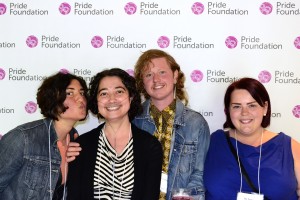When Pride Foundation scholar Carmel Aronson was in first grade, she dropped her lunchbox during Passover—spilling her matzah and charoset onto the floor. The smell and appearance of her food was strange to her young classmates, whose lunches looked drastically different.
Reflecting back on that moment, Carmel said, “My difference was so obvious that nobody sat with me at lunch for the rest of the week.”
Carmel was born in a small town in Oregon that had no Jewish residents other than her family. She learned about difference and exclusion from an early age—giving her a heightened understanding of how institutionalized oppression plays out in people’s daily lives.
Being Jewish has always been a central component of Carmel’s identity, and she noted that if she wasn’t personally representing Judaism in her interactions, “then Judaism didn’t exist.”
When she was in her mid-twenties, Carmel came out as a lesbian. She struggled at first. Learning how to navigate the waters of dating women was challenging, and she did not have a clear sense of how to fully merge her Jewish identity with her queer identity.
A few years after coming out, however, she had a realization: “I belonged—not in spite of who I am, but because of it, exactly how I am.”
Carmel has actively upheld the different ways that people’s identities intersect ever since. Because of her experiences growing up, she says she has learned to be “sensitive and aware of who is being targeted in what situation.”
This has allowed her to bridge gaps between communities and create open spaces where people can feel comfortable bringing their whole selves to the table.
As the 2011 keynote speaker during Pride Shabbat at Temple De Hirsch Sinai in Seattle, Carmel shared her coming out story and spoke about how important it is to create these spaces.
“I couldn’t help but wonder what would my life be like if every place that I went was welcoming of who I am,” Carmel said. “What if I never had to wonder if this town, or this business, or this synagogue wanted me there? What if I never even had to ‘come out’ as any part of my identity because welcoming space was created and being held, regardless of who stepped through the door?”
She has brought a similar curiosity and vision to her volunteer work with Gender Odyssey, an international conference focused on the needs and interests of transgender and gender non-conforming people. After realizing that there was no programming that looked at Jewish identity and how it relates to sexual orientation and gender identity, Carmel began planning and coordinating culturally specific events and activities for Jewish members of Gender Odyssey.
The response she got was extremely positive and affirming. The first Shabbat potluck she coordinated drew the majority of Gender Odyssey’s Jewish attendees.
Carmel’s commitment to community-building runs deep. She exudes compassion, thoughtfulness, and leadership on a daily basis, and she is committed to supporting our community far into the future.
Currently a social worker, Carmel plans to use her scholarship funds to expand her knowledge in the addiction field, including alternative forms of healing, with a goal of holistically supporting people who experience addiction.
As someone who has struggled with addiction herself, Carmel’s own process “has shown me that deep healing on a personal level can and does bring about collective healing on the community level.”
Carmel is a strong proponent of love-based activism, or as she puts it, “the type of social justice activism that doesn’t require anyone to step away from any of their identities to show up entirely in the room.” She plans to bring that perspective to her future work by creating an inclusive environment that is welcoming of everyone, exactly how they are.
It is a philosophy that Pride Foundation shares.
When asked what it would mean to have a scholarship dedicated to the Jewish LGBTQ community, Carmel replied, “Pride Foundation is making a statement [to Jewish LGBTQ students] that we see you, we know who you are, and we want you here. You don’t have to lose, or hide a critical piece of yourself in order to be accepted in the queer community.”
We are deeply honored to support Carmel through our scholarship program, and hope to support more students like her in the future through the Bashert Scholarship.
